 Often there is a book that I haven’t read that I know I should make time for, but the fact of the matter is that there are more books that I should read than time that I can make. Recently, I made time to read Phillips Brooks’ classic on preaching, The Joy of Preaching (or Lectures on Preaching as it was previously known).
Often there is a book that I haven’t read that I know I should make time for, but the fact of the matter is that there are more books that I should read than time that I can make. Recently, I made time to read Phillips Brooks’ classic on preaching, The Joy of Preaching (or Lectures on Preaching as it was previously known).
This books is a classic on preaching and is famous because of Brooks’ definition of preaching as “truth through personality.” I anticipated reading about the making of a sermon, the delivery of a sermon, and even the making of the preacher to a great extent. What I didn’t anticipate, however, is the emphasis given by Brooks on the necessity of courage and “manliness” in these lectures first delivered at the Yale Lectures on Preaching in 1877. He encourages pastors to make “yourself acceptable to people, and winning by all manly ways their confidence in you, and in the truth which you tell.”
Further, Brooks encourages preachers to be pastors and pastors to be preachers, insisting that pastoral duties enhance one’s ability to preach. He also writes about that all too familiar struggle in the pastorate between making time for sermon preparation and making time to be with the people God has called you to shepherd,
The two parts of a preacher’s work are always in rivalry. When you find that you can never sit down to study and write without the faces of the people, who you know need your care, looking at you from the paper; and yet you never can go out among your people without hearing your forsaken study reproaching you, and calling home, you may easily come to believe that it would be good indeed if you could be one or other of two things and not both; either a preacher or a pastor, but not the two together. But I assure you you are wrong. The two things are not two, but one…The preacher needs to be pastor, that he may preach to real men. The pastor must be preacher, that he may keep the dignity of his work alive. The preacher who is not a pastor grows remote. The pastor who is not a preacher grows petty.
Why is this book important today? Because in the growing reformed movement among evangelicals (of which I am a part), there is a renewed emphasis on the preaching ministry of the pastor. However, in that renewed emphasis, I fear that the pendulum of the pastorate may be swinging so far toward preaching that other important aspects of shepherding are being neglected. To paraphrase from Brooks above, the preacher of today sits down to write and study and ignores the faces of the people. This must not be so, God has called you to more than preaching, he has called you to a place and a people. Preaching is a part of your calling, but not all of your calling.
I heard of a recent pastoral candidate who informed a search committee that he would need 40 hours per week to focus on sermon preparation. 40 hours!? Where is the pastoral care if 40 hours of the week is spent in sermon preparation? The sermon is valuable, and I would argue that the ministry of preaching is probably the primary activity of the pastor, but it is far from the only necessary activity of the pastor. The very term, pastor, means shepherd. Christ is our heavenly shepherd, pastors are called as his undershepherds to tend his flock in imitation of Christ, the one who would leave the 99 to seek out the 1. Christ preached, but he also cared, and ministered, and sat with the sick, cried with the grieving, and lived his life with his people.
Certainly, much shepherding can be done through the preaching ministry of any church. But, much of the shepherding can only be done one on one through discipleship, counseling, discipline, and prayer. Grieving church members need to experience the love of their pastor during their times of loss. Pastors should rejoice with their people over the births of children and new jobs. Pastors should live among their people, eating with them, playing with them, and even traveling with them to show that they are more than a man in front of a microphone, that the pastor is indeed a regular guy living out the Christian faith in real life circumstances.
Pastor, you must be a man for the people and for individuals. You will primarily be a man for the people in the pulpit, but you will be a man for individuals in hospital rooms, in grieving homes, at football games, and at the lake. God has called you to your study but only because he has first called you to his people. Honor God and his people to whom you have been given care by being both preacher and pastor. Love them as Christ has loved you. Much of the Joy of Preaching is the Joy of Pastoring.


Pingback: Weekly Web Watch
Pingback: Passion For Preaching » Blog Archive » Book Review: The Shepherd Leader